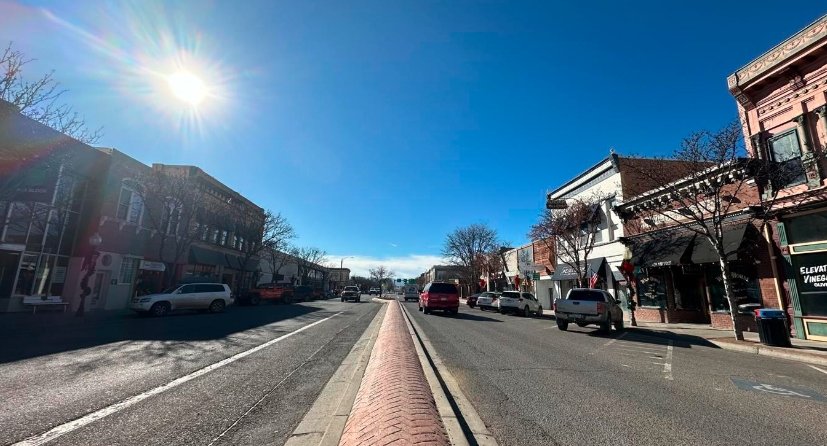The small town of Montrose in Colorado has decided to remain a non-sanctuary city, refusing to accept immigrant relocations in a move that is spreading around the state.
What is a non-sanctuary city?
A non-sanctuary city is a city that does not limit its cooperation with federal immigration authorities, and does not provide any special protection or benefits to undocumented immigrants. Non-sanctuary cities comply with federal laws and requests regarding immigration enforcement, such as detaining and transferring immigrants to ICE custody.
Montrose is one of the few cities in Colorado that has declared itself a non-sanctuary city, after an emergency City Council meeting on March 7th, 2024. The decision was unanimous, with all seven council members voting in favor of the resolution.
Why did Montrose make this decision?
The main reason behind Montrose’s decision was to send a clear message to the federal government and the state capital that the town does not want to be involved in the immigration crisis that is affecting the country.
According to the resolution, Montrose is “concerned about the negative impacts of illegal immigration on the community, including increased crime, reduced public safety, lower wages, higher taxes, and increased demand for public services.”

The resolution also states that Montrose “supports the rule of law and the constitutional rights of all citizens and legal residents of the United States, and opposes any efforts to undermine or violate the sovereignty and security of the nation.”
How does this affect Montrose and Colorado?
Montrose’s decision to remain a non-sanctuary city has drawn mixed reactions from the residents and the state officials.
Some residents support the decision, saying that it is necessary to protect the town from the influx of immigrants and the potential problems they may bring. They also argue that the town does not have the resources or the capacity to accommodate more people, especially those who are undocumented and may not contribute to the local economy or society.
Other residents oppose the decision, saying that it is discriminatory and inhumane to deny help and refuge to people who are fleeing from violence and poverty in their home countries. They also claim that the town is missing an opportunity to welcome and integrate new and diverse members of the community, who may enrich the culture and the economy of Montrose.
The state officials have also expressed their views on Montrose’s decision. Governor Jared Polis, a Democrat, has criticized the move, saying that it is “un-American and un-Coloradan” to turn away immigrants who are seeking a better life. He has also urged the town to reconsider its stance, and to join the state’s efforts to provide humanitarian assistance and legal pathways to citizenship for the immigrants.
On the other hand, Senator Cory Gardner, a Republican, has praised the move, saying that it is “a courageous and patriotic act” to stand up for the rule of law and the national security. He has also pledged to support the town’s decision, and to work with the federal government to secure the border and reform the immigration system.
What is the immigration situation in Colorado?
Colorado is one of the states that has been affected by the surge of immigrants arriving at the southern border of the United States. According to the latest data from the U.S. Customs and Border Protection, more than 100,000 immigrants were apprehended or encountered at the border in February 2024, a 28% increase from January 2024, and the highest number since March 2019.
Many of these immigrants are unaccompanied minors or families with children, who are seeking asylum or humanitarian protection in the United States. Due to the overcrowding and the lack of facilities at the border, many of them are being relocated to other states, including Colorado.
According to the Colorado Department of Human Services, the state has received more than 1,000 unaccompanied minors from the border since January 2024, and expects to receive more in the coming months. The state has also agreed to host up to 2,200 immigrant families at a hotel in Aurora, a suburb of Denver, for a period of six months.
The state has been working with various agencies and organizations to provide shelter, food, health care, education, and legal services to the immigrants, while they await their immigration proceedings or their reunification with their relatives in the United States.
However, the state has also faced some challenges and criticisms in handling the immigration situation. Some of the challenges include the lack of funding, staff, and space to accommodate the immigrants, the risk of COVID-19 transmission and outbreaks, the coordination and communication with the federal authorities, and the integration and assimilation of the immigrants into the local communities.
Some of the criticisms include the opposition and resistance from some local governments and residents, who do not want to host or support the immigrants, the lack of transparency and accountability from the state and the federal authorities, and the violation and neglect of the human rights and the best interests of the immigrants.
What is the future of immigration in Colorado and the United States?
The immigration situation in Colorado and the United States is likely to remain complex and controversial in the foreseeable future, as the factors and forces that drive the migration flows are not expected to change or diminish anytime soon.
Some of the factors and forces include the political and economic instability, the violence and insecurity, the poverty and inequality, the climate change and natural disasters, and the demographic and social changes in the countries of origin of the immigrants.
Some of the challenges and opportunities include the enforcement and reform of the immigration laws and policies, the protection and integration of the immigrants and their rights, the cooperation and coordination among the different levels and branches of government, and the engagement and participation of the civil society and the public opinion.
The immigration situation in Colorado and the United States will also depend on the actions and reactions of the various actors and stakeholders involved, such as the immigrants themselves, the federal and state authorities, the local governments and communities, the media and the academia, the non-governmental and faith-based organizations, and the international and regional partners.
The immigration situation in Colorado and the United States will also have significant implications and impacts on the economic, social, cultural, and political aspects of the country and the state, such as the labor market and the workforce, the education and the health systems, the diversity and the identity, and the democracy and the security.
Therefore, the immigration situation in Colorado and the United States will require a comprehensive and balanced approach, that takes into account the interests and the needs of all the parties involved, and that seeks to find solutions that are fair, humane, and sustainable.













